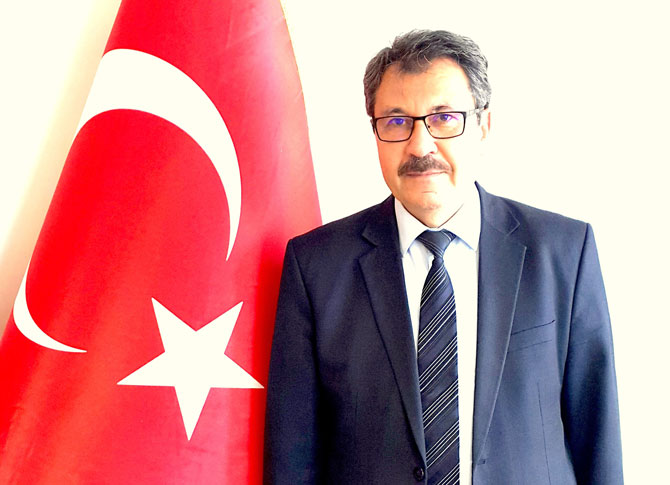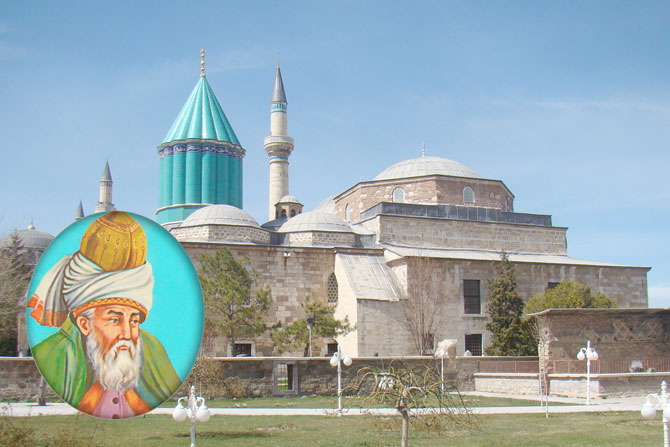How did Mevlana come to Konya?
Selcuk University Director of Mevlana Research Institute Prof. Dr. Ali Temizel talked about Mevlana's arrival in Konya and the political, religious, military and climate structure of that day.

Selcuk University Director of Mevlana Research Institute Prof. Dr. Ali Temizel talked about Mevlana's arrival in Konya and the political, religious, military and climate structure of that day. Emphasizing that Mevlana should be seen as a friend of humanity, Prof. Dr. Temizel said, “Because Mevlana is neither a statesman nor a commander of an army. He was the sultan of the hearts and the realm of meaning ”.
How did Mevlana, an important value for Konya, come to Konya? What kind of political, religious and military structure was there in those times? Selcuk University Director of Mevlana Research Institute Prof. Dr. Ali Temizel made evaluations on the issue. Saying that Mawlana lived in the business of peace and friendship with the rulers of that day, befitting a real Sufi for the benefit of the people, Prof. Dr. Ali Temizel said, "Mevlana lived in Konya for 44 years in total until December 17, 1273, when he moved to the eternal realm. This period in the relations with Turkey have continued Seljuk managers, "he said.

HOW DID MEVLNA COME TO KONYA?
Saying that when Mevlana came to Konya, he was welcomed by Sultan Alaaddin and the people of the city. Temizel said, "The Seljuk Sultans' efforts to transform Anatolia into a security and civilization zone attracted the masters of science, mysticism and art to Anatolia like the Turkmen nomads who fled in front of the Mongols. In this connection, Mevlana and his family started a journey from Horasan to Belh and reached many countries. After this migration, Mevlana and his family reached Larande (ie today's Hero), he stayed here for a little over seven years. Mevlana married Gevher Bânû Hatun, daughter of Şerafettin Lala, who came to Larende with them, and their children named Sultan Veled and Alaaddin were born. During this period, the Seljuk Sultan, Alaeddin Keykubat I, the Seljuk Sultan who loved and valued the scholars and scientists very much, ruled in Konya, the capital of the Seljuks. With the promotion of distinguished scholars such as Muhiddin Arabi, Sadreddin Konevî, and the Ulama like Şehâbeddin Sühreverdî and the like, Konya became a science and culture center. Sultan Alaeddin Keykubat insistently invited Mevlana's father Bahaeddin Veled to Konya to join this circle of scholars. Upon this, Mevlana, his family and his father Bahâeddin Veled left Karaman and came to Konya on May 3, 1228 ”.
‘THE SELJUK STATE IN THAT PERIOD WAS THE SUBSIDIARIES FOR TURKEY’
Temizel, Mevlana lived in the period when I Alaaddîn except Keykubad period, Turkey Seljuk Empire, said that in the event of a principality giving tribute to the Mongols. Temizel added: "The traces of the Crusaders in Anatolia were not erased yet. The people were in despair in an environment of fear, horror and insecurity in the face of the Mongol attacks. The sultans, most of whom ascended the throne at a young age, were ineffective in the face of the Mongol rulers. Managers were distrustful of each other. In this atmosphere, Mevlânâ Celâleddin in Konya became an increasingly listened personality with his spiritual personality. The anguish of the people arising from being dependent on the Mongols was mitigated by the love and respect felt towards this great personality. In several letters written to the Mongol rulers in Mevlana's book Mektûbât, it is pointed out that he applied as intercessor of the people and that the Mongol rulers accepted Mevlana's requests and was a valuable personality in their eyes. "

‘A SPIRITUAL GUIDE THAT MAKES THE FUTURE GREEN: MEVLÂNA’
Underlining that Mevlana was seen as a spiritual guide that would make the future green, Temizel said, "The authors of the Menakıbname talk about Mevlana's relationship with many Seljuk sultans and statesmen. Eflâki, in his work named Menâkibu'l-Arifin, conveys the relations of Mevlana with the prominent rulers of the period and the Seljuk authorities. The most detailed information about Mevlana's relations with the rulers can be found in the work named Menâkibu'l-Arifin. There are various information about these relations in Sipehsâlâr and Fîhi Mafîh. In the Letters of Mevlana, on the other hand, a special dimension of these relations is encountered. Mevlana, Turkey has given the collapse of the Seljuk Empire during the trust for the people and managers with ideas and works, and a hope for the future flourishing was seen as a spiritual guide. Mevlana became friends with everyone in this competitive environment and had important effects on the people and the administrators. In this turbulent period, Mevlana connected the hopeless to life and gave them the joy of life. Mevlana lived for nine years, during the reign of Sultan Alaaddin Keykûbad, until the death of Sultan Alaaddin Keykûbad in 1237 after he came to Konya in 1228.
‘LIVED IN PEACE AND FRIENDSHIP WITH THE MANAGERS’
Noting that Mevlana lived in peace and friendship with the rulers of that day, Temizel said, “Mevlevi sources, the victory of Sultan Alaeddin Keykubâd against Celâleddin Hârizmşah in 1230, the sultan went to the tomb of Bahaeddin Veled (Mevlana's father) and prayed while he was on a campaign. and they say that thanks to this he won. Among the Seljuk Sultans, a contemporary of Mevlana, especially II. Izzeddin Keykavus (1245 - 1257) and IV. Rükneddin Kılıç Arslan (1257-1266) were in the presence of Mevlana and participated in the sema 'assemblies. The emirs and viziers of the era were happy to meet Mawlana. Alaeddin Keykubad, who is contemporary with Mevlana, II. Gıyaseddin Keyhüsrev, III. Gıyaseddin Keyhüsrev, IV. Rükneddin Kılıçaslan, II. He met with sultans and rulers such as Izzeddin Keykavus, Muineddin Pervane, Sahib Ata Fahreddin Ali, Emineddin Mikâil, Celaleddin Karatay on various occasions, and he wrote letters to some of them. This shows that Mawlana lived in the peace and friendship business with the rulers of that day for the benefit of the people, as befits a true sufist. Mevlana lived in Konya for a total of 44 years, until December 17, 1273, when he moved to the eternal realm. This period in the relations with Turkey have continued Seljuk administrators, "he told us.
‘HELPED EVERYONE’
Saying that Mevlâna extended a hand to everyone who asked for help at that time, Temizel said, "Mevlana's having good relations with the Mongols should not be interpreted as abuse on behalf of Mevlana. The events should be evaluated within the conditions of that period. Because Mevlana is neither a statesman nor a commander of an army. He was the sultan of the hearts and the realm of meaning. Like every mystic, he opened his arms to anyone who ran to him. The purpose of Mawlana's getting along with the Mongols was not to strengthen their dominance. Mevlana's aim was to help those in a difficult and desperate situation. In this state, Mevlana ended his speech by saying that he should be seen as a friend of humanity, not a Mongolian friend.
SÜMEYRA KENESARI / YENİ HABER

